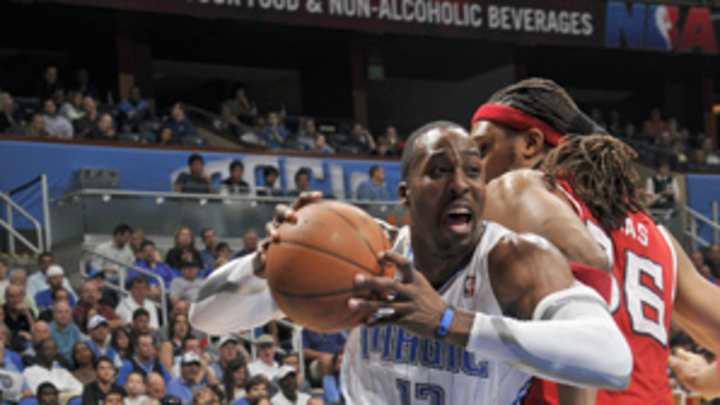Fast Breaks: Hawks vs. Magic, Game 1


A bit of revenge after last year? Sure looked that way as the Hawks, who finished the season with a dreadful 11-20 record, walked away with a surprising 103-93 road victory in Game 1, one year after absorbing an historic playoff beat-down at the hands of the Magic. Atlanta struggled to stop Dwight Howard, whose career night included 31 points in the first half alone, but the Hawks' offense managed to fly by Orlando to claim the first game.
• Many analysts expected that Atlanta would need a grind-it-out defensive game to prevail win, but it was actually a blistering shooting performance that carried the Hawks. Atlanta scored 68 points in the second and third quarters combined -- the Hawks caught fire from outside in the second quarter in particular, shooting 9-12 on shots taken from 18 feet or beyond, including 6-of-7 on 18-foot-plus two-point shots. Normally, Orlando loves for its opponents to take those types of long twos, considered to be the least-efficient shots in basketball. Sometimes, it's just one of those nights. However, Atlanta was second in the league in both attempts and field-goal percentage on shots taken from 16-23 feet on the season. For the game, Atlanta hit 51.4 percent of its shots overall, against a Magic defense that was fourth in the league in field-goal-percentage defense at 43.6 percent.
• On the other side, Orlando couldn't get its vaunted three-point game going no matter what it tried. In the first half, Orlando repeatedly dumped the ball inside to Dwight Howard, who feasted on single coverage for his 31 points, as Atlanta was content to stay home on everyone else. It made for a bizarre second quarter, as Orlando (mainly via Howard) was repeatedly scoring within three feet of the basket, while Atlanta was continually hitting from 18 feet and beyond. In the second half, the Magic went to more of a pick-and-roll game, and Nelson's increased aggression led to his third-quarter explosion. Still, other than Nelson hitting a couple threes right off of ball-screens, the Magic weren't able to consistently get good looks at threes. For the game, Orlando hit just 6-of-22 (27 percent) from downtown, well below its league-leading numbers of 9.4 makes and 25.6 attempts per game from behind the line.
• Jameer Nelson's strong stat line of 27 points on 10-of-18 shooting belies the defensive work done by Kirk Hinrich, an underrated player in the game. Nelson went off for 13 points and his only assist in the final 4:13 of the third quarter, after Hinrich went to the bench. Hinrich had a game-high plus-21 in just 28 minutes of action. He was acquired at the trade deadline to beef up Atlanta's perimeter defense, and in Game 1, he did just that, doing a good job of containing Nelson's penetration and preventing him from collapsing the Hawks' defense. Hinrich was also feeling it on offense, as he hit 6-of-10 and dropped a sweet combination-iso move -- between-the-legs plus a crossover into a step-back 19-footer -- on J.J. Redick, which delighted the Hawks bench in the second quarter.
• Jason Collins has a history of playing strong defense on Howard, and many consider their matchup to be key to the series. It was an odd night for "Twin," as he registered a strong plus-14 in 18 minutes, despite scoring just one point. Collins didn't necessarily stop Howard, who scored seven points on him in the game's first seven minutes, but the Hawks' big man deserves credit for being on the floor during a critical 11-0 run in the third quarter. Plus, six of Howard's eight turnovers came when Collins was on the floor. Give props to the veteran defensive specialist, for sure, but on this night, Atlanta won primarily with offense.
• Something's gotta give with Orlando's turnover problem. The Magic averaged 14.9 turnovers a game during the season (sixth most in the league), while Atlanta was second worst in forcing them (opponents averaged 12.5 a game). On Saturday, it was advantage Hawks, as Orlando committed 18 turnovers (compared to Atlanta's nine). Many of Orlando's turnovers were careless, but Atlanta also deserves credit for being locked in on D, especially on the perimeter, where ball pressure forced long passes into the post, which sometimes turned into miscues.
